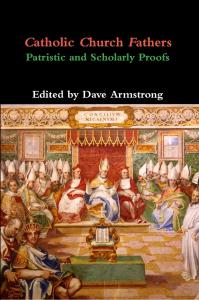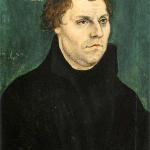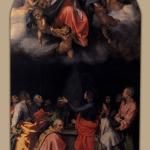
“Please Hit ‘Subscribe’”! If you have received benefit from this or any of my other 4,600+ articles, please follow this blog by signing up (with your email address) on the sidebar to the right (you may have to scroll down a bit), above where there is an icon bar, “Sign Me Up!”: to receive notice when I post a new blog article. This is the equivalent of subscribing to a YouTube channel. Please also consider following me on Twitter / X and purchasing one or more of my 55 books. All of this helps me get more exposure, and (however little!) more income for my full-time apologetics work. Thanks so much and happy reading!
***
David T. King, the most vitriolic, uncivil anti-Catholic zealot I have ever encountered, bar none; a guy who wrote, “Many historians on both sides have said Rome killed as many as 35 million, others say 1/10th of a billion” (in the public chat room of James White on 29 June 2000), made the following utterly fictional, ridiculous statement in his self-published book:
No Church father believed the Church as a whole to be infallible. The opinion was that individual bishops, as well as bishops in Council, could err. It is our contention that the early Church fathers, with unanimous voice, point us back to holy Scripture as the only infallible norm. (David T. King, Holy Scripture: The Ground And Pillar of Our Faith, Volume 1, Washington: Christian Resources Inc., 2001, 138-139; my bolding and italics)
Anti-Catholic Reformed Protestant polemicist James Swan on 8-20-06, gushed over this volume, referring to it as “the most important book on Sola Scriptura written in the last 100 years” (“The Imprimatur: Watch What You’re Reading My Catholic Friends”). So let’s see how historically accurate this monumental achievement in fringe anti-Catholic Protestant pseudo-apologetics actually is (and then seriously wonder whether King or Swan have any intellectual credibility left):
Church Fathers Who Affirmed an Infallible Church
Ignatius of Antioch: For as many as are of God and of Jesus Christ are also with the bishop. . . . If any man follows him that makes a schism in the Church, he shall not inherit the kingdom of God. (Epistle to the Philadelphians, ch. 3)
Irenaeus: In this order, and by this succession, the ecclesiastical tradition from the apostles, and the preaching of the truth, have come down to us. And this is most abundant proof that there is one and the same vivifying faith, which has been preserved in the Church from the apostles until now, and handed down in truth. (Against Heresies, 3, 3, 3)
But Polycarp also was not only instructed by apostles, and conversed with many who had seen Christ, but was also, by apostles in Asia, appointed bishop of the Church in Smyrna, whom I also saw in my early youth, for he tarried [on earth] a very long time, and, when a very old man, gloriously and most nobly suffering martyrdom, departed this life, having always taught the things which he had learned from the apostles, and which the Church has handed down, and which alone are true. (Against Heresies, 3, 3, 4)
. . . to confirm at the same time the minds of the neophytes, that they may preserve stedfast the faith which they have received, guarded by the Church in its integrity, in order that they be in no way perverted by those who endeavour to teach them false doctrines, and lead them away from the truth . . . (Against Heresies, 5, Preface)
Wherefore it is incumbent to obey the presbyters who are in the Church — those who, as I have shown, possess the succession from the apostles; those who, together with the succession of the episcopate, have received the certain [or infallible] gift of truth [charisma veritatis certum], according to the good pleasure of the Father. But [it is also incumbent] to hold in suspicion others who depart from the primitive succession, and assemble themselves together in any place whatsoever, [looking upon them] either as heretics of perverse minds, or as schismatics puffed up and self-pleasing, or again as hypocrites, acting thus for the sake of lucre and vainglory. For all these have fallen from the truth. And the heretics, indeed, who bring strange fire to the altar of God — namely, strange doctrines— shall be burned up by the fire from heaven, as were Nadab and Abiud. Leviticus 10:1-2 But such as rise up in opposition to the truth, and exhort others against the Church of God, [shall] remain among those in hell (apud inferos), being swallowed up by an earthquake, even as those who were with Chore, Dathan, and Abiron. Numbers 16:33 But those who cleave asunder, and separate the unity of the Church, [shall] receive from God the same punishment as Jeroboam did. 1 Kings 14:10 (Against Heresies, 4, 26, 2; cf. 4, 26, 5; my bolding and italics and bracketed interjections)
Anglican Church historian J. N. D. Kelly summarizes Irenaeus’ view:
His most characteristic thought, however, is that the Church is the sole repository of the truth, and is such because it has a monopoly of the apostolic writings, the apostolic oral tradition and the apostolic faith. Because of its proclamation of this one faith inherited from the apostles, the Church, scattered as it is throughout the entire world, can claim to be one [haer. 1,10,2]. Hence his emphasis [E.g., ib. 1,9,4; 1,10,1 f; 1,22,1] on ‘the canon of the truth’, i.e. the framework of doctrine which is handed down in the Church and which, in contrast to the variegated teachings of the Gnostics, is identical and self-consistent everywhere. In a previous chapter we noted his theory that the unbroken succession of bishops in the great sees going back to the apostles themselves provides a guarantee that this faith is identical with the message which they originally proclaimed. (Early Christian Doctrines, HarperSanFrancisco, revised 1978 edition, 192)
Clement of Alexandria: . . . so also are we bound in no way to transgress the canon of the Church. . . . in the truth alone and in the ancient Church is both the exactest knowledge, and the truly best set of principles (airesis). (Stromata, VII, 15)
The eminent Protestant Church historian Philip Schaff describes the perspective of the Ante-Nicene Fathers, including Clement:
No heresy can reach the conception of the church, or rightly claim any one of her predicates; it forms at best a sect or party, and consequently falls within the province and the fate of human and perishing things, while the church is divine and indestructible.
This is without doubt the view of the ante-Nicene fathers, even of the speculative and spiritualistic Alexandrians . . . (History of the Christian Church, Vol. II: Ante-Nicene Christianity: A.D. 100-325, Grand Rapids, Michigan: Eerdmans, 1970; reproduction of 5th revised edition of 1910, Chapter IV, section 53, “The Catholic Unity,” pp. 169-170, 172)
Hippolytus:
Patristics scholar Johannes Quasten describes his view:
Throughout his refutation of heresy, he purposes to prove the Church the bearer of truth and the apostolic succession of the bishops the guarantee of her teaching. (Patrology, four volumes, Vol. II: The Ante-Nicene Literature after Irenaeus, Allen, Texas: Christian Classics; division of Thomas More Publishing, no date, p. 202)
Cyprian: I profess that I both have rendered and do render the greatest thanks without ceasing, dearest brother, to God the Father Almighty, and to His Christ the Lord and our God and Saviour, that the Church is thus divinely protected, and its unity and holiness is not constantly nor altogether corrupted by the obstinacy of perfidy and heretical wickedness. (Epistle 46: To Cornelius, 1)
[T]he Catholic Church has been shown to be one, and to be able neither to be cut nor divided. (Epistle 46: To Cornelius, 2)
[T]he Church which believes on Christ, and holds that which it has once learned, never departs from Him at all, and that those are the Church who remain in the house of God; . . . (Epistle 54: To Cornelius, 7)
. . . the Church does not depart from Christ; . . . (Epistle 68: To Florentius Pupianus, 8)
[T]he Church herself also is uncorrupted, . . . (Epistle 72: To Jubaianus, 11)
Tertullian: all doctrine must be prejudged as false which savours of contrariety to the truth of the churches and apostles of Christ and God. (The Prescription Against Heretics, chapter 21)
J. N. D. Kelly summarized Tertullian’s view:
[F]or Tertullian what was believed and preached in the churches was absolutely authoritative . . . . . . the one divine revelation was contained in its fulness both in the Bible and in the Church’s continuous public witness. (Early Christian Doctrines, ibid., 36, 39-41)
Origen: [A]s the teaching of the Church, transmitted in orderly succession from the apostles, and remaining in the Churches to the present day, is still preserved, that alone is to be accepted as truth which differs in no respect from ecclesiastical and apostolical tradition. (De Principiis, preface, complete section 2)
Also, from the same book: “he may judge these to be heretical and opposed to the faith of the Church” (Bk. I, ch. 7, part 1); “We have now to ascertain what those matters are which it is proper to treat in the following pages according to our dogmatic belief, i.e., in agreement with the creed of the Church” (Bk. I, ch. 7, part 1). “the punishments of sinners, according to the threatenings of holy Scripture and the contents of the Church’s teaching”; “some take offense at the creed of the Church” (Bk. II, ch. 10, part 1)
Hilary of Poitiers: It is the peculiar property of the Church that when she is buffeted she is triumphant, when she is assaulted with argument she proves herself in the right, when she is deserted by her supporters she holds the field. (On the Trinity, VII, 4)
Cyril of Jerusalem: It is called Catholic then because it extends over all the world, from one end of the earth to the other; and because it teaches universally and completely one and all the doctrines which ought to come to men’s knowledge, concerning things both visible and invisible, heavenly and earthly; . . . . (Catechetical Lecture XVIII, section 23)
Athanasius: It is enough merely to answer such things as follows: we are content with the fact that this is not the teaching of the Catholic Church, nor did the fathers hold this. (Letter No. 59 to Epictetus, 3)
What defect of teaching was there for religious truth in the Catholic Church . . .? (De Synodis, I, 3)
Ambrose: Seeing, therefore, that men who agree not among themselves have all alike conspired against the Church of God, I shall call those whom I have to answer by the common name of heretics. (Exposition of the Christian Faith, Bk. I, chapter 6, section 46)
Augustine: It is obvious; the faith allows it; the Catholic Church approves; it is true. (Sermon 117, 6)
For my part, I should not believe the gospel except moved by the authority of the Catholic Church. (Against the Epistle of Manichaeus 5,6)
Cyril of Alexandria: the church, having Christ for a foundation, and an immovable support, is perfectly immoveable. (Commentary on Isaiah, 4)
Church Fathers Who Affirmed the Infallibility of Ecumenical Councils
Cyprian: [A]lthough long since it was decreed, in a council of the bishops, . . . (Epistle 65, 1)
Basil the Great: [Y]ou should confess the faith put forth by our Fathers once assembled at Nicæa, that you should not omit any one of its propositions, but bear in mind that the three hundred and eighteen who met together without strife did not speak without the operation of the Holy Ghost, . . . (Letter #114 to Cyriacus, at Tarsus; NPNF2-8)
Gregory Nazianzen: I never have and never can honour anything above the Nicene Faith, that of the Holy Fathers who met there to destroy the Arian heresy; but am, and by God’s help ever will be, of that faith; . . . (Letter #102: Second to Cledonius the Priest, Against Apollinarius; NPNF2-7)
Ambrose: Of the Acts of Councils, I shall let that one be my chief guide which three hundred and eighteen priests [at the Council of Nicaea: 325 AD], appointed, as it were, after the judgment of Abraham, made (so to speak) a trophy raised to proclaim their victory over the infidel throughout the world, prevailing by that courage of the Faith, wherein all agreed. Verily, as it seems to me, one may herein see the hand of God, . . . (Exposition of the Christian Faith, Bk. I, Prologue, section 5)
Athanasius: But the word of the Lord which came through the ecumenical Synod at Nicea, abides forever. (Ad Afros Epistola Synodica 2)
Who will not denounce their audacity, that being but few in number, they would have their decisions to prevail over everything, and as desiring the supremacy of their own meetings, held in corners and suspicious in their circumstances, would forcibly cancel the decrees of an uncorrupt, pure, and Ecumenical Council? (Ad Episcopos Aegypti et Libyae, 7)
Cyril of Alexandria: [H]e opposes the truth and the very symbol of the Church’s Faith, which the fathers once gathered together at Nicea through the illumination of the Spirit defined; he, fearing lest any should keep whole the Faith, instructed unto the Truth by their words, endeavours to calumniate it and alters the significance of the words, . . . against the holy fathers who have decreed for us the pious definition of the Faith which we have as an anchor of the soul both sure and steadfast, as it is written. (Tomes Against Nestorius: I, 5)
[T]he holy Churches in every region under Heaven, and the venerable Fathers themselves who put forth unto us the definition of the right and undefiled Faith, viz. (the Holy Ghost speaking in them) that the Word of God was made flesh and became Man, . . . (Tomes Against Nestorius: IV, 2)
***
*
Practical Matters: Perhaps some of my 4,600+ free online articles (the most comprehensive “one-stop” Catholic apologetics site) or fifty-five books have helped you (by God’s grace) to decide to become Catholic or to return to the Church, or better understand some doctrines and why we believe them.
Or you may believe my work is worthy to support for the purpose of apologetics and evangelism in general. If so, please seriously consider a much-needed financial contribution. I’m always in need of more funds: especially monthly support. “The laborer is worthy of his wages” (1 Tim 5:18, NKJV). 1 December 2021 was my 20th anniversary as a full-time Catholic apologist, and February 2022 marked the 25th anniversary of my blog.
PayPal donations are the easiest: just send to my email address: [email protected]. Here’s also a second page to get to PayPal. You’ll see the term “Catholic Used Book Service”, which is my old side-business. To learn about the different methods of contributing (including Zelle), see my page: About Catholic Apologist Dave Armstrong / Donation Information. Thanks a million from the bottom of my heart!
*
***
*
Photo credit: cover for one of my three patristics books; my copyright [see book info. and purchase information]
Summary: Anti-Catholic Protestant David T. King stated that “NO Church father” believed in the infallibility of the Church or councils. This is sheer nonsense, as I massively document.













